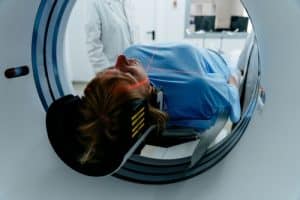In Canada, the most common cancer diagnosed in 2022 is lung cancer with 30,000 new cases expected. Moreover, this is followed by breast cancer and prostate cancer with 28,900 and 24,600 new cases expected, respectively.
Between sexes, cancer incidence differs as well. In males, prostate cancer is most common (20%), followed by lung cancer (12%). Among females, breast cancer is expected to be the most common (25%), followed by lung cancer (13%). It is also expected that cancer diagnosis is higher among males compared to females by 15%.
Cancer-related Mortality
In 2022, it is expected that 85,100 Canadians will die from cancer. A quarter of these deaths are expected to be from lung cancer (20,700 deaths), the most common cancer in Canada. Between sexes, cancer mortality is most likely from lung cancer for both males and females (24% and 25%, respectively). However, cancer-related mortality is higher among males than females by 13%. Cancer mortality is highest in Nunavut (268.4 per 100,000 with 35 deaths expected). This is followed by Nova Scotia (216.8 per 100,000 with 3,000 deaths expected) and Newfoundland and Labrador (215.0 per 100,000 with 1,600 deaths expected).

Importance of a Full Body MRI
The importance of screening is huge and can save lives. As you can see, in Canada, cancer is still a prevalent issue, with an estimated 43% of Canadians being diagnosed with cancer at least once in their lives. If you do not want to be in the statistics, take care of yourself.
Therefore, it is evident that cancer screening is more important now than ever. There are many ways to help screen for cancer. The Full body MRI scans offer a comprehensive scan from your head to just below the knees to help screen for cancer among other diseases.
Why Full Body MRI is Important for Cancer Detection
- Early Detection: Full body MRI scans can detect tumors at an early stage, often before symptoms appear. This early detection can significantly improve treatment outcomes and survival rates.
- Comprehensive Screening: Unlike other diagnostic tools that focus on specific areas, full body MRI scans provide a comprehensive view of the entire body. This allows for the detection of cancerous growths in multiple areas, ensuring no potential issues are missed.
- Non-Invasive Procedure: Full body MRI is a non-invasive and painless procedure.
- Detailed Imaging: Full body MRI scans offer high-resolution images that can reveal even the smallest abnormalities. This level of detail is crucial for accurately diagnosing and staging cancer.
- Monitoring High-Risk Individuals: For individuals with a family history of cancer or genetic predispositions, full body MRI scans provide a reliable method for ongoing monitoring and early intervention.
So, knowing that you are actively monitoring your health with comprehensive tools like full body MRI scans can provide peace of mind. In brief, as I have shown, It reassures you that you are doing everything possible to stay healthy and catch any issues early.
How Prevalence Can Guide Future Research
With this data, resources can be allotted accordingly to more needed areas, health policies can be assessed, and research priorities can be decided. For example, since the most common cancer diagnosed in Canada is lung cancer, more resources can be focused on reducing lung cancer risk factors. Research can also be focused on lung cancer treatments, diagnosis, and care.
Regular screenings and check-ups are essential for maintaining health and catching potential issues early. By incorporating full body MRI scans into your check-up routine, you take proactive steps towards preventing cancer.
Works
2021-pdf-en-final.pdf (cancer.ca)
Projected estimates of cancer in Canada in 2022 | CMAJ






